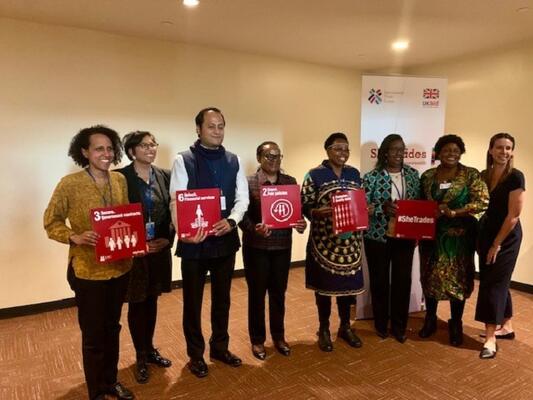
Effective measurement tools essential for empowering women in the economy (en)
Programmes and policies to empower women as equal actors in the economy require effective measurement tools to track impact, said policymakers and experts at an event organized this week in New York by the International Trade Centre. One recurring theme during the meeting was the importance of collecting sex-disaggregated data – a key step for understanding gender-specific policy effects.
The gathering, held on the sidelines of the 11-22 March session of the United Nations Commission on the Status of Women, focused on successes and challenges in tracking progress on women’s economic empowerment.
In her opening remarks, ITC Deputy Executive Director Dorothy Tembo emphasized that measuring economic empowerment was critical to assess progress towards achieving Sustainable Development Goals and indicators related to gender equality, as well as to understand the effectiveness of action springing from initiatives such as the Buenos Aires Declaration on Women and Trade.
‘The impact of trade on gender equality is incredibly nuanced and tracking progress comes with its own set of questions’, Tembo said. ‘How do we measure economic empowerment? How do we account for bias and societal norms? How do we develop comparable indicators which make sense across countries and societies?’
The first part of the discussion was led by Mayra Buvinic, a Senior Fellow at the Center for Global Development and Data2X, UN Foundation; Kate Grantham of the Institute for the Study of International Development, McGill University; and Judith Fessehaie of ITC’s SheTrades Initiative. The speakers argued that while measurement tools were essential for effective programme design and implementation, there is tremendous heterogeneity in approaches used to measure women’s economic empowerment: over 75 different measures are currently in use.
Focusing on one dimension of women’s economic empowerment, namely opportunities for women in trade, ITC’s Fessehaie presented SheTrades Outlook, a tool to assess, monitor and improve how institutional ecosystems empower women to trade. This tool will enable policymakers to track progress on their trade and gender policy priorities.
The second part of the discussion brought in perspectives from policymakers such as Namibian Minister of Gender Equality and Child Welfare Doreen Sioka; Bangladeshi Deputy Minister for Education Mohibul Hassan Chowdhoury; Joanna Roper, UK Special Envoy for Gender Equality; Rose Rwabuhihi, Rwanda’s Chief Gender Monitor; and Joyce Babbie Mwikali Mutinda, Chairperson of Kenya’s National Gender and Equality Commission.
Each speaker discussed how women’s economic empowerment was being measured in their respective country, presenting policies and interventions aimed at increasing women’s participation in political leadership (Namibia), supporting women entrepreneurs (Bangladesh), mainstreaming gender into trade and development policies (UK), institutionalising the collection and analysis of sex-disaggregated data in order to monitor policies and develop sectoral strategies (Rwanda), and leveraging government procurement to support female vendors (Kenya).
In doing so, speakers discussed the challenges they faced in tracking progress, as well as the successes they had enjoyed in doing so. Among the themes emerged from the lively discussion were the importance of making the collection of sex-disaggregated data mandatory rather than optional, and of increasing female participation in politics to move economic empowerment higher up on the policy agenda. Key challenges identified were the difficulties of measuring women’s participation in the informal economy, and of reaching the most vulnerable and disadvantaged groups. Participants stressed the importance of measuring different aspects of women’s economic empowerment, such as in terms of capabilities as well as livelihoods.



